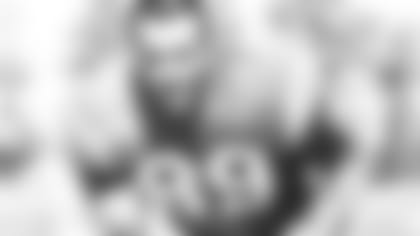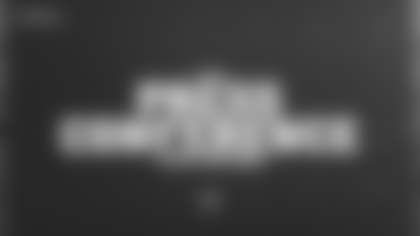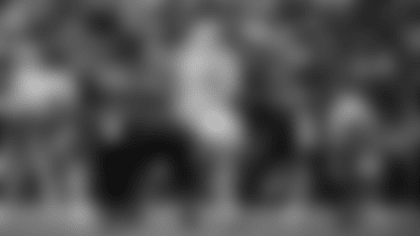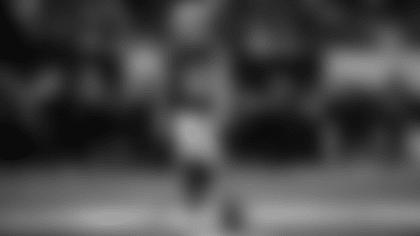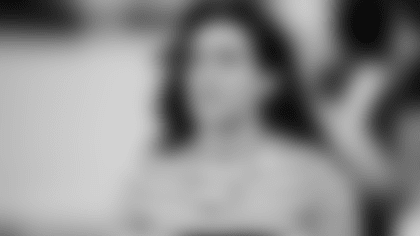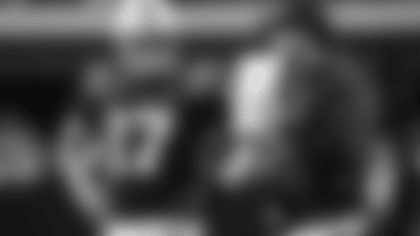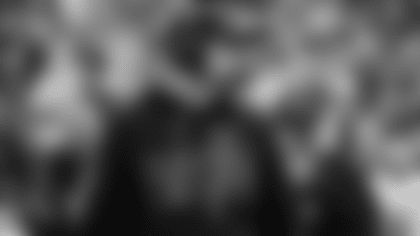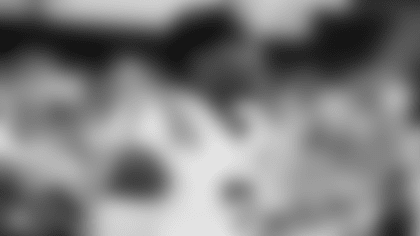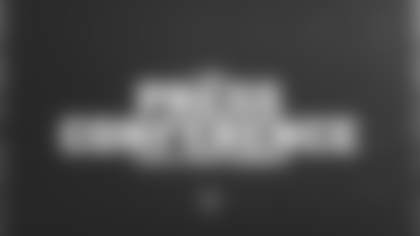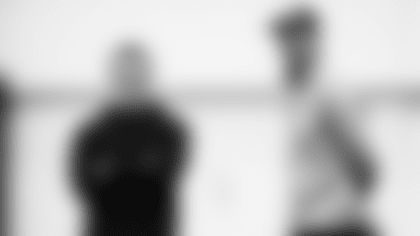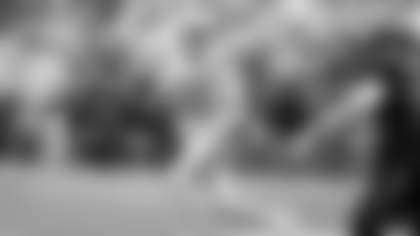Who was the toughest opposing player you ever faced?
"There were two guys I had trouble with. One was Forrest Gregg of Green Bay. He was probably one of the smallest guys I played in front of, but he was so quick and well balanced that it was tough. My whole thing was speed. I was fast, but I could never lose him that often. I did it once or twice a game, but that was it. The other guy was Bob St. Clair of San Francisco. He was 6-9 or 6-10. He was so tall he blocked out the stadium. Those were the two toughest guys for me."
Which opponent was the toughest team to face on a regular basis?
"The team I could honestly say on a regular basis I didn't like to face was the Los Angeles Rams. They weren't that good. They usually didn't even have a winning record. Every time I went against them at home or out there, I had a bad game. Sometimes I sat there and almost told Weeb Ewbank not to play me that day. I had trouble doing anything against them. I don't know why because they weren't that good. Those are the facts, though."
Did you have a favorite stadium or opponent that you liked to play against the most?
"My favorite stadium and team to play against was in Wrigley Field against the Chicago Bears. I just loved playing in that stadium because you were so close to the fans. In the end we worked out in, you could almost shake hands with the fans. They would cuss at you and say, 'Marchetti, we're going to get you.' I would laugh at them and it was fun. They were practically on the field, and Wrigley was a beautiful place. The reason I liked playing the Bears in those days was because they never had a good offense. They were known for their defense, and I think that's true today. For some reason, they always had strong defenses and strong linebackers, but the offense was not quite there."
If you had one situation in a game that meant victory or defeat, what teammate could you count on the most?
"I would have to go with our entire defense – Art Donovan, (Gene) Big Daddy Lipscomb, Don Joyce, Bill Pellington, Dick Szymanski and Don Shinnick. I would take those guys against anybody. It was proven. They (the Giants) tried to run against us in the (1958) championship game. They had three yards to go and couldn't make it. In the second championship game they had six or eight inches to make a first down and didn't make it. We went on to give them a licking. I would take all those guys, not just one."
Do you think teamwork is more necessary in football than in any other team sport?
"Sure. I was next to Art Donovan and we played beside each other so long that we knew each other's moves. If my speed got me out of position, he would always be there. If he got in trouble, I was always there. We took turns rushing the quarterback – me, Art, Big Daddy (Lipscomb) and Don Joyce. If any of us went out of the way to get sacks, it would put others at risk. We had to play together and protect each other. I think in baseball one manager said, 'It's a team sport played by individuals.' Football is a team sport played by teammates."
What did it mean to you to be voted into 11 straight Pro Bowls?
"Nothing. I think the most exciting thing for any athlete is when something good happens for the first time. The first time I made All-Pro I was elated. The first Pro Bowl I went to I couldn't believe it. I liked it. I went home to Antioch (California) and told my friends, 'I'm going to the Pro Bowl.' I was as happy as could be. All that wears off after that 'first time.' I loved doing it and playing against the greatest athletes in pro football. At that time if the league said you were going to the Pro Bowl, you couldn't say no. The league would fine you, probably more money than you made all year. You had to appear. When you appeared, the athletes played to win. It made for a good game, but the excitement was the best after the first time."
What made Weeb Ewbank a great coach?
"Weeb was smart, a good offensive mind. He knew talent. The draft (class) he brought in in 1955 with George Preas and Alan Ameche, there must have been 12 rookies that made the team. Twelve rookies out of 33 players was a good percentage. He knew talent. His only downfall and I told him, was he was too good and easy on the players. After a few years of being too easy, you lose the team. Players aren't afraid of discipline. We never quit but after we won two championships (it was different). It wasn't like it was (later) with Don Shula. He was a disciplinarian. When he said something, you did it. If you broke curfew, it was going to cost you. If you were John Unitas, you got fined. Weeb may have had a tendency to forget it, but if it were Gary Cuozzo, the third quarterback, he raised heck with him. That was his only downfall. Weeb was very smart and organized. I always said if I took as many notes in college as I did in his meetings, I would have graduated sooner."
Did you see things in Don Shula that led you to think he would become the winningest NFL coach ever?
"Yes. As soon as we traded for him as a player you could see what he had beyond playing ability. Shula was a defensive specialist, and he was as good then as the coaches were. He made our team not because of ability, but because he was so smart. He was really good. After he was hired at age 33 to coach our team, I was asked by one of our executives what I thought about Shula becoming the coach. I said, 'He knows every aspect of the game. He's tough on everybody and guys respected him.' He was very vocal as a player and helped do some of the planning. During games, he was tough. If you took a timeout when he was one of our players, you heard it from him. You just didn't do that unless you really were hurt, you'd better be hurt. I wasn't surprised when he was hired, and I was not surprised at the success he had during his career. Guys who played under Shula learned a great deal about the game. He was as outstanding when he started with us as when he ended up winning the most games a coach ever won."
What was it like watching the end of the 1958 Championship game lying on a stretcher with a broken leg? How tough was it to get home that night?
"I was hurt late in the game on the key rushing play. The Giants were yelling at me to get up because they thought I was trying to kill time. I told them I was really hurt. When I was on the sidelines, I watched John Unitas take the team down for tying field goal. It was one of John's greatest drives. When the game ended tied, players didn't really know what would happen. There never had been an overtime game in a championship scenario, so everyone was wondering what would happen. Word came down that overtime would be used and the first team to score won. I had watched the tying drive from the sideline on a stretcher from around the 50-yard line. I had a good seat. There were about 25,000 to 30,000 Baltimore fans at the game and they were concerned about getting me off the field in case the game ended with a quick score. They wanted to take me in. I remember seeing the Giants getting the overtime kickoff, but I was taken under the stands. I could hear the crowd roaring, but I did not know what was happening since there were fans of both teams in the stands. I didn't know if we were doing well or the Giants were doing well. I could hear rumbling and noise. It was tough. Finally, Bill Pellington came running into the locker room saying we were the world champions. At that point, the leg felt good. We flew home that night and there were about 30,000 fans at the airport. The plane stopped on the runway and the team got on buses. I had to get into an ambulance. The team was told the buses would move through the crowd and that they should wave. Well, the crowd didn't move. They climbed all over the buses. I told the ambulance driver to go a different way, and we got out of there. I remember going into the city and there was a man and his son by the side of the road with a flashlight pointed toward a sign they made that said, 'Welcome home, champs.' I guess they didn't want to fight the airport crowd, and I remember them being there along the road."
What was the most outstanding thing you ever saw John Unitas do?
"The drive to tie the 1958 title game was great, but I will give you another one. It was in the 1958 comeback game against San Francisco when we won the Western Conference. John and Raymond Berry pulled a great play. It was a third down and John came to the sideline to talk to Weeb (Ewbank). John was talking to Weeb and Weeb could not decide the play to use and he told John, 'Just go ahead and get the first down.' John threw a pass to Raymond and he must have jumped three feet off the ground. Raymond seemed to just hang there like basketball players do. It looked like Raymond was standing three feet off the ground and he had to reach up another four to five inches to catch the ball on his fingertips. He caught it, we got the first down and went on to score. I think that was most important play of the year for us. John threw it where he had to, and Raymond made the greatest catch in the world. It was a special play between two great players. I bet John told Weeb, 'Just forget it. I'll get it for us.' "
Who was the flakiest or strangest teammate you ever had, and why?
"Don Shinnick. He was flaky. On game day, you'd hear a guy barking out marching orders, 'Hup, two, three, four.' Don was marching. He marched himself into the locker room, and he did it all the way to his locker. It was almost like he was in the service, like a sergeant would drill you. He would get dressed and do all kinds of nutty things. He was a hell of a football player."
How hard was it when you had to give up the NFL for good?
"It wasn't hard at all. It was probably more important then than now, but I had planned to retire two years before they let me. I was ready to go because I was starting the restaurants, and I was very happy with the responsibility of making them run correctly. As soon as the season was over, I went to work in the restaurants. I never really missed it (playing). Actually, when there was a big game on television I couldn't stand it, like a championship or playoff game. I still get keyed up for that these days. It's important for players today to invest their money wisely. When you take that jersey off, things are a lot different. When you play, you can go anywhere. You get the best tables, you get everything. Sometimes guys go into business and let friends run things and you go out of business. I had teammates that had bad experiences because they did not run things themselves. It's important to work at anything you do in life. Players need to know there are people out there who will go after them. In football you may be the greatest, but in business there are 'sharpies' who will get you."
What advice would you give all rookies entering the NFL?
"The advice is what I just said. Work hard and know there will come a time when you won't play. Prepare ahead of time and stay involved in everything you do. Don't become a bad business statistic."
It was 50 years ago that Wilt Chamberlain scored 100 points in a game in Hershey, Pennsylvania. Tell people why the Colts are a footnote to that evening.
"We had a Colts basketball team in the off-season, and we played 40 games in the off-season. We were playing the Philadelphia Eagles basketball team that night before the NBA game. We beat the Eagles, by the way. I remember meeting Wilt Chamberlain before the game, and I wanted to say something to him. I wanted to say, 'Hey, Wilt, how's the weather up there?' I had gotten that so often during my life that I wanted to say it to someone else. He was tall. We left at halftime to go to a club. The next morning we read where he scored 100 points. He was a big guy, strong. It's very hard to believe that was 50 years ago."
Are you still remembered as often as always?
"What amazes me about our era is that Baltimore fans still hang onto the old Colts. When we go down for appearances, the lines are a block long. They still want your autograph. This is after a lot of years. It amazes me that they still know who you are and the importance of the 1959 championship game. A lot of people talk about the 1958 game, but we won it in 1959, too."
The NFL has been around for 92 years. If you could play in another era when would it be, or would you stay in the era in which you played?
"I think the years we played were more exciting as an individual than it would be today. Even though players make more money now, we were excited to play. We loved to play. Sometimes we'd go out on the field on Sundays and play catch and do things. We would go out with John (Unitas) and he would throw on a day off and we would catch passes. It was just fun. I would have liked to have made more money, but I liked playing in the 1950s. I'll stay where I was."


